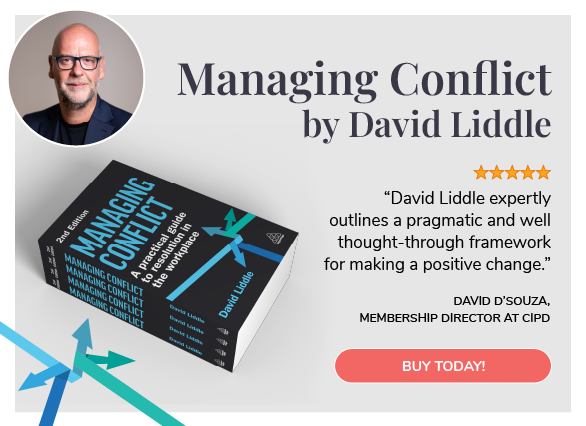
Share article:
Tags:
TCM STORY – FROM CONFLICT TO CONSENSUS
Standing in an inner-city estate in Leicester, David Liddle takes a deep breath. It’s 1995, and the young mediator has been using his skills to help solve community issues for a couple of years already. But now he’s stood outside a house – thick with smoke, sweat, and 20 angry residents baying for the blood of the local teenagers who have tipped the street into all-out-war. David collects his thoughts, steels himself, and goes inside.
This is a case that David remembers fondly, for it was ultimately a great success. “The mediation process brought the entire street together and gave all residents a chance to explore their concerns and resolve some of the underlying problems” recalls David. But it was not the toughest assignment in his 8 years running one of the first community mediation schemes in the UK. The most serious was in the aftermath of a young girl’s murder by her ex-boyfriend, who went on to commit suicide. The two families were devastated and diametrically opposed, a shrine set up in his memory had been desecrated and the entire community had been torn in two.
“The inquest had been scheduled and the police’s family liaison officer requested mediation to help calm the dangerously strained relations between the 2 families”, David recounts. “On the day of the inquest, the father of the murdered girl said, via the local paper, that he understood the other family had experienced a loss too. Prior to the mediation he saw the boy (and his family) as the devil incarnate. I use that as a benchmark – if those two families can come into a room together, then anyone can.”
The decision to apply his mediation techniques to a workplace setting came almost by accident
The Local Authority was going through a substantial period of change in the late 1990s and asked David to mediate in disputes that arose from that change.
“Some of the issues that people were raising in terms of their reaction to organisational change was very similar to what people would say to me when they’d experienced criminality, offending or neighbour disputes: sleeplessness, anxiety, the trauma and the stress of conflict”, he says.“I saw for the first time that this was happening in offices, and that the skills set and model that I’d created translated into a workplace setting.”
In response David put himself through an MBA, wrote a thesis on the emerging management system ‘Total Quality Management’ – TQM – and wondered if by dropping the ‘Q’ and adding a ‘C’ – Conflict – he could combine his new business interests with his mediation experience.
“The principles of TQM – whole organisational change, regularly reviewing and adapting processes, multiple stakeholder engagement – worked in terms of conflict management too”, says David. He set up TCM – or Total Conflict Management – in June 2001. One of TCM’s first clients was the Cabinet Office. “I don’t know how they heard about me, but they did”, he laughs. “There weren’t many competitors out there doing this at that time and the majority of those who were had mostly adapted a previous offering into a workplace arena – whereas what I had set up was specifically dedicated to mediating conflict in the workplace, and I was pretty much the first to do so. The word must have spread.”
THE POWER OF MEDIATION
Mediation gives everyone the space and the time to step out of themselves. To say, ‘everyone stop. Pause. Let’s come into another space which is safer.

TCM trains over 1,000 individuals annually – managers, HR professionals, business leaders
TCM offers both open-access courses at the TCM HQ in the City of London, or bespoke courses for companies in-house, the training is accredited by the Open College Network and the Institute of Leadership and Management. TCM also offers external mediation for high level disputes, parachuting in “when a HR director is really running out of options”, as David puts it, as well as consultancy, diagnostic tests and establishing organisational systems and processes to help to manage conflict.
Julie Foster, the Equality and Diversity Manager at Hertfordshire Constabulary, approached TCM to help set up an internal mediation service in 2010. “Police officers are taught similar skills for dispute resolution, for neighbourhood disputes in particular. But we didn’t have a workplace mediation service”, she explains. “We ran a thorough tender process to help set one up and TCM won.”
When asked what TCM offered that others did not, she responds, “Oh that’s easy – absolute partnership and flexibility… that’s continued right up to today. If there’s ever anything I’ve got a query about or we want to explore, I just ring up and I know they will be there to support us. Our feeling right from the beginning has been borne out over time.”
The power of mediation, argues Carole Russell, Head of Employee Relations, BT Retail, who has worked with TCM for over three years, is in “offering people alternatives. [Before we began mediation] our culture was such that individuals had to go down formal grievance route. Putting an end to that was the real selling point for the business.”
“But even more important was being able to get in very quickly and address issues before they became entrenched.” Initially Carole attended a TCM course and gained became a TCM accredited Mediator (“a week of training followed by submitting coursework”), and then asked TCM to advise on setting up an internal mediation service. “Whilst one person can do a mediation, that is only one person. Within BT Retail there are 23,000 employees, and within that many people will have issues. TCM advised, coached, and then we sat down and agreed how we could extend the approach to the wider BT Group.”
“We completely changed the way that we interacted with our people when they were raising issues or complaints”, continues Carole, who now manages the internal team of mediators. “Traditionally, if an individual raised a complaint we relied on a more formal process of dispute resolution. It was more adversarial. Really that was missing out on the opportunity to address the real issues, sit down and go through them – and that’s what mediation does. Everybody wins with mediation, no-one loses.”
Having now taken part in thousands of successful mediation sessions, David believes that, “Mediation gives everyone the space and the time to step out of themselves. To say, ‘Everyone stop. Pause. Let’s come into another space which is safer, and where we can look at this in the round’. In doing so mediation encourages people to become more rational, more reflective… And the mediator is very active in that process, getting the parties to transform or re-frame their thinking in a way that derives real value from the conflict. What I mean by that is mediation enables the parties to take responsibility for the conflict and it’s resolution. The mediator helps them to have an empathic and compassionate conversation. That’s what we do.”
THE BUSINESS BENEFITS
Mediation not only allows employees to feel happier and come back to work, but also instils in people that the best way to resolve issues is to get them out in the open, sit down and discuss them.
 The Cost of Conflict in the Business
The Cost of Conflict in the Business
Eleven years ago, when TCM first started out, the business benefits of mediation weren’t so well-known. In fact, the term ‘mediation’ itself wasn’t widely understood. Now, however, the evidence is strong. The costs of conflict run to an estimated annual £33 billion to UK business according to the CBI, taking up 20% of leadership time and resulting in 370 million days lost. Whereas the Chartered Institute for Personnel and Development (CIPD) finds that almost 60% of companies using mediation see a significant reduction in formal grievances and a reduction of employment tribunal claims by almost 50%.
Averting the daunting costs of a tribunal is, says Helen Goss, employment solicitor and partner at Boyes Turner, a significant business benefit. “The cost of going to tribunal is astronomical, not just in terms of legal fees and any award that the court may give, but also in terms of time and energy and loss of business focus.” At BT, says Carole Russell, “Over the last four years I have personally conducted just under 500 mediation sessions, with only two that had to be stopped. Previously, any one of them could have ended up in an employment tribunal.”
The experience at BT echoes that of Marks & Spencer. Philip Edwards, Employee Relations Manager at M&S and a keen advocate of mediation and the TCM approach (see box below), says, “When we do a mediation in a region, we suddenly get three or four other referrals from that region because people realise how good it is. I think anyone who encounters mediation and sees it in action, absolutely understands the benefits.”
At Hertfordshire Constabulary, Julie has also seen mediation help to reduce long-term sickness absence rates. “We got one person back from long-term sick leave, and they would not have come back without mediation. Their fear of facing this other person was a big block to them returning. That is a huge business benefit. In terms of average days lost to manage a grievance, the latest figures are about 14 days – 9 of which are management days. Compare this to a mediation which takes 4 days of staff time.” Carole has also seen this at BT. “Without a shadow of a doubt we can demonstrate that this improves rates of long-term sickness leave… Mediation not only allows employees to feel happier and come back to work, but also instils in people that the best way to resolve issues is to get them out in the open, sit down and discuss them.”
THE TCM APPROACH
The training is enjoyable and relaxed, but there’s also a strong business focus…
 Success in over 93% of Mediation Cases
Success in over 93% of Mediation Cases
The mediators at TCM have had success in over 93% of mediation cases and established well over 100 internal mediation schemes in the past 11 years. When talking to clients, the most common thing that crops up is the importance of TCM’s partnership approach whereby no request is deemed too hard or too small. Mary Siddall, Senior Legal Advisor at Southampton University, first contracted TCM to train its mediators in 2007 and praises the enthusiasm of the TCM team. “The training is enjoyable and relaxed, but there’s also a strong business focus… I think TCM stands out as a specialist in workplace mediation. Workplace mediation requires particular skills and a particular approach and TCM has really established itself as a leading provider in that area.”
David Liddle has not been standing still since establishing a market-leader in workplace mediation. Keen to professionalise the industry and share best practice, he also set up the Professional Mediators’ Association (PMA) in 2007 to deliver CPD and strict practice standards. Now with over 1000 members, the PMA is seeking independent status as a professional body for the industry.
David’s work both with TCM and the PMA has attracted plaudits from external observers too. Mike Emmott, CIPD employee relations adviser, says he’s “impressed by the way in which TCM has been trying for the last few years to build the market for mediation… one has to say that TCM under David’s leadership has played a leading role in that.” Work that is still ongoing, says David. Perhaps influenced by this year’s London Olympics, he says“I feel that the last eleven years have been about us walking to the starting blocks. Mediation is now a credible activity in the eyes of many HR directors, but now we need to move from credible to mainstream. My vision is for mediation to become embedded into the systems, processes, structures and cultures of organisations. Of course, it doesn’t happen overnight, it’s a tough journey. And yes, the longevity of TCM – the expertise, the work we’ve done over the past decade, means that we are the market leaders – but that just gives us a head-start.”
David has made a series of significant strategic decisions over the past few years. None more so than his decision to employ a team of full time mediators and trainers rather than relying on freelance capacity. “This”, says Rebecca D’Cunha, TCM’s Director of Resolution Services, “has given us the capability to deliver increasingly complex and challenging assignments for our customers. Our speed of response and our expertise give us a real edge in the marketplace”. It’s not always been easy, says David. “We are as affected as any small business by the economic challenges”. However our team ethos, our vision and our unwavering commitment to quality gives us the drive to succeed.
Ever-ambitious, David adds, “My real passion is for mediation to create strong, high-performing relationships, and play a really important part in driving economic growth in the UK economy in the years ahead.” In a sense, he has come a long way since his days mediating in inner-city Leicester; but in another way, it is exactly those days that still inspire him to take mediation even further still.








